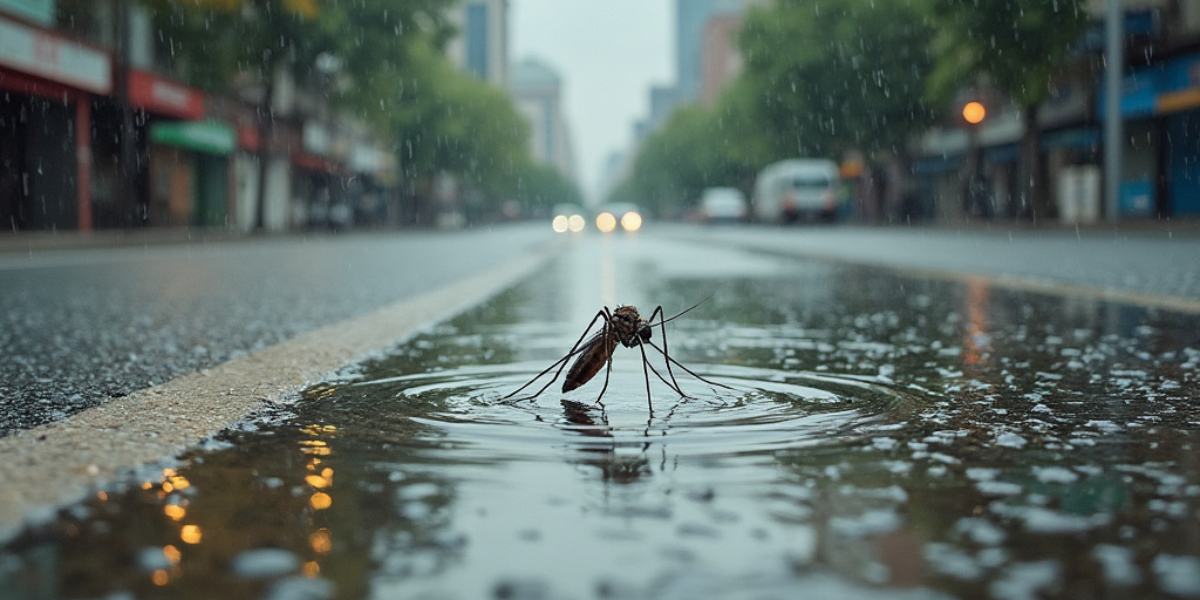Chikungunya outbreak is emerging as the more pressing health concern in Telangana this season, with even children taking longer to recover.
Published Nov 20, 2024 | 7:00 AM ⚊ Updated Nov 20, 2024 | 7:00 AM

Representative image of a mosquito
Earlier this month, the Centers for Disease Control and Prevention (CDC) of the United States issued a Level 2 Travel Health Notice for Telangana, citing a significant increase in Chikungunya cases among travellers returning to the US from the state.
CDC travel notices are issued for four levels – level 1 urges travellers to take the necessary precautions; level 2 is to “practice enhanced precautions”; level 3 means “reconsider non-essential travel”; and level 4, the highest alert, means “avoid all travel.”
Recent reports from the health department of Telangana confirmed 152 Chikungunya cases out of 2,673 samples tested.
The outbreak has also drawn attention to the 6,405 dengue cases in the state, though Chikungunya is emerging as the more pressing health concern this season, with even children and teenagers taking longer to recover and experiencing several symptoms.
Chikungunya is a viral disease transmitted by mosquitoes, characterised by high fever, severe joint pain, and post-viral complications such as chronic arthritis.
This season, health professionals have observed the troubling trend of prolonged symptoms among children and teenagers, lasting up to a month or longer, making this outbreak one of the most severe in the past decade.
The CDC recommends that travellers use insect repellents, wear long-sleeved clothing, and stay in air-conditioned accommodations or those with screens on windows and doors to keep mosquitoes out.
“You can protect yourself by preventing mosquito bites, which includes using insect repellent; wearing long-sleeved shirts and pants; and staying in places with air conditioning or that have screens on the windows and doors,” said CDC.
It also said that a recently developed vaccine is available for individuals aged 18 and older travelling to outbreak regions.
However, the vaccine is contraindicated for individuals with weak immune systems, severe allergies to the vaccine’s components, or pregnant women. The CDC advises pregnant women to reconsider travel to Telangana, particularly for ones in late stages of pregnancy.
Infection around the time of delivery poses severe risks to newborns, including long-term health complications.
Vaccination during pregnancy is generally discouraged during the first trimester and after the 36th week, though high-risk cases may warrant a discussion with healthcare providers.
Telangana has reported 152 confirmed Chikungunya cases so far this year, with Hyderabad, the state capital, recording the highest number at 61 cases. Mahbubnagar and Wanaparthy districts follow with 19 and 17 cases, respectively, according to official data.
During peak monsoon season, doctors observed a sharp surge in cases, with some clinics across Telangana registering 5-10 new Chikungunya cases daily. The outbreak has strained hospital resources, as patients grapple with severe joint pain, fever, and persistent post-viral symptoms.
Meanwhile, dengue cases remain higher overall, with 5,372 confirmed cases during the same period.
Despite dengue’s prevalence, health experts warn that chikungunya could dominate among vector-borne diseases this year due to the debilitating nature of its symptoms.
“There’s been a noticeable rise in chikungunya cases among children. Recovery periods have stretched from the typical 7-10 days to 15-20 days or longer, particularly for teenagers. Children are reporting severe joint pain, fever, and rashes, with the joint pain often leading to chronic complications if not managed properly,” Dr. Sai Kiran Chilukuri, a Hyderabad-based physician told South First.
The Telangana government has stepped up efforts to control the spread of vector-borne diseases through fever surveys, fogging operations, and public awareness campaigns targeting mosquito breeding.
However, many doctors have expressed concern about the under reporting of chikungunya cases. Under reporting of cases also poses a challenge to effective outbreak management, as the true scale of the disease burden remains unclear.
Symptoms often overlap with dengue and malaria, leading to misdiagnosis, thus complicating accurate disease tracking.
(Edited by Rosamma Thomas)
